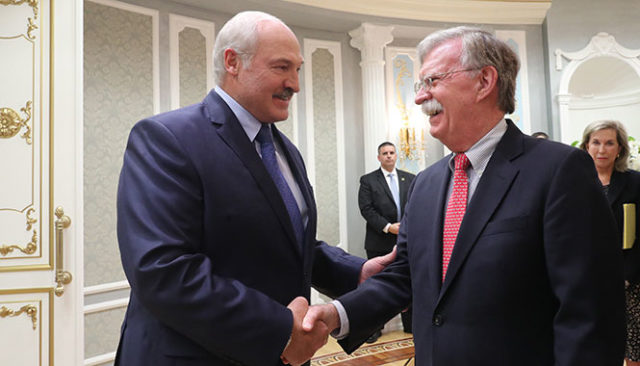
Lukashenka, Bolton and Russia’s Double-Headed Eagle
Publication: Eurasia Daily Monitor Volume: 16 Issue: 121
By:

United States National Security Advisor John Bolton’s visit to Minsk was preceded, accompanied and followed by an unprecedented number of commentaries in Belarus and Russia. For the most part, however, they constitute a self-contained phenomenon. That is, the respective publications hardly cast any light on the visit. Rather, they are reflective of whose feathers have been ruffled the most.
That said, a few exceptions to this rule exist. One of them pertains to the question of weapons non-proliferation, which Bolton reportedly discussed with President Alyaksandr Lukashenka. Indeed, this was also one of only two topics of conversation that Bolton himself acknowledged to the press (see EDM, September 3). According to the independent Belarusian military expert Alexander Alesin, Belarus’s fairly large potential as an arms dealer was showcased at the Milex-2019 exhibition, held in Minsk last spring. Contracts signed during the exhibition totaled $200 million, though Belarus’s military industrial committee did not disclose the content of these contracts. However, just recently, it was reported that Bulgaria asked Belarus to modernize and repair an Su-25 jet and then five more aircraft. The parliament of Bulgaria—a member of the North Atlantic Treaty Organization (NATO)—even changed the prohibitive law that would have prevented the government’s ability to send its military aircraft for upgrade in Belarus (Svaboda.org, September 3).
Yet another important segment of Belarus’s arms trade, according to Alesin, is repair and modernization of Soviet-legacy air-defense systems—such as the S-125 Pechora and S-200 anti-aircraft missile systems. At a plant in Borisov, Belarusians upgraded dozens of the former complexes, giving them the name Pechora 2MB. These modernized air-defense systems are now in great demand, the military analyst noted.
Finally, the Belarusian military-industrial sector produces radio-electronic reconnaissance and electronic warfare systems, including ones able to undermine connectivity by jamming the sources of electromagnetic radiation. The Belarusian company Radar, for example, reports it is selling its equipment to 15 countries but does not specify which. Alesin believes that Bolton, during his visit, expressed hope that Belarus would not supply air-defense and anti-drone systems to certain countries—most probably customers around the Gulf. As US sanctions against Belarus are not yet removed, Bolton apparently offered to work in that direction and possibly suggested additional incentives that would be the subject of future negotiations, opined Alesin (Svaboda.org, September 3).
As for the whereabouts of the ruffled feathers, they are almost exclusively in Russia. As Geworg Mirzayan, a Russian commentator, pointedly alleged, Washington failed to organize a color revolution in Minsk. “That is why the United States decided to enter from another door and to gain control of Belarus—not through temptations of the lower classes, but through the ambitions of the elites. Specifically, through the desire of Minsk to geopolitically blackmail Moscow. It is no secret that Russian-Belarusian relations are now in a very difficult situation. Largely because the process of integration between the two countries stalled, which it did due to Belarusian leadership” (Life.ru, August 29).
Some Belarusian commentators feel the need to justify themselves. “The [Bolton] visit bespeaks strengthening the role and influence of Belarus in regional and world politics,” opines Valery Voronetsky, who chairs the foreign affairs commission of the Belarusian parliament. “It is another matter when such visits take place […] there will always be political forces that do not like this. These are our ill-wishers. In Russia and not only, there are many forces that are annoyed by the strengthening of Belarusian influence in the region.” At the same time, in the Kremlin, according to Voronetsky, the reaction to the US National Security Advisor’s visit to Belarus was supposedly calm and friendly (Belta.ru, September 1). Indeed, the press secretary of the Russian president issued a statement that, as a sovereign country, Belarus is free to accept whomever it wishes (Tut.by, August 28).
Yet, Dmitry Peskov’s tone may not reflect the actual attitude. After all, so many dark pronouncements have shown up in the Russian press and in the media outlets presenting themselves as facilitators of the Russia-Belarus Union State. One such outlet, Sonar2050, responded to the seemingly innocuous observation that, in the long-run, contacts like those with Bolton strengthen Belarus’s sovereignty, by declaring, “This is like saying that, whereas in the United States, the source of sovereignty is the people, in Belarus it [stems from] the visits of American representatives” (Sonar2050, September 3).
In truth, however, with such a preponderance of ties and dependencies that connect Belarus with its huge, powerful and expansionary eastern neighbor, a higher-level visit from a major but distant center of power does in fact help boost Belarusian sovereignty. Even such a neutral and sophisticated observer as Yauheny Preiherman, the head of the Minsk Dialogue Initiative, entitled his commentary for Russia’s Valdai Club “John Bolton in Minsk: How to Avoid the Trap of Misunderstanding in Belarus-Russia Relations” (ValdaiClub, September 3). Apparently, the potential for misunderstanding or rather censure and loss of trust is considerable.
The prices of natural gas and oil that Belarus buys from Russia remain uncertain despite the fact that the blueprint of Belarusian-Russian integration has been agreed upon and 31 taskforces are about to start pushing its implementation (Belta.by, September 6). Speaking in Brest, Lukashenka applied his usual arguments: a) Russians and Belarusians are one people, b) Belarus has been bearing the brunt of the Chernobyl disaster, and c) nobody wants Lukashenka in the West (Belta, September 6). But at the same time, he made the rather notable point that Belarus “should continue looking both east and west. And Russia can hardly reproach us on this account. Even their double-headed eagle [i.e., Russia’s national emblem] looks both ways, so nobody can ban us from doing the same” (Belta, September 6).
Clearly, Lukashenka is an astute and tough negotiator, and Moscow knows this all too well. That Washington may now share this sort of knowledge can only be for the better.



